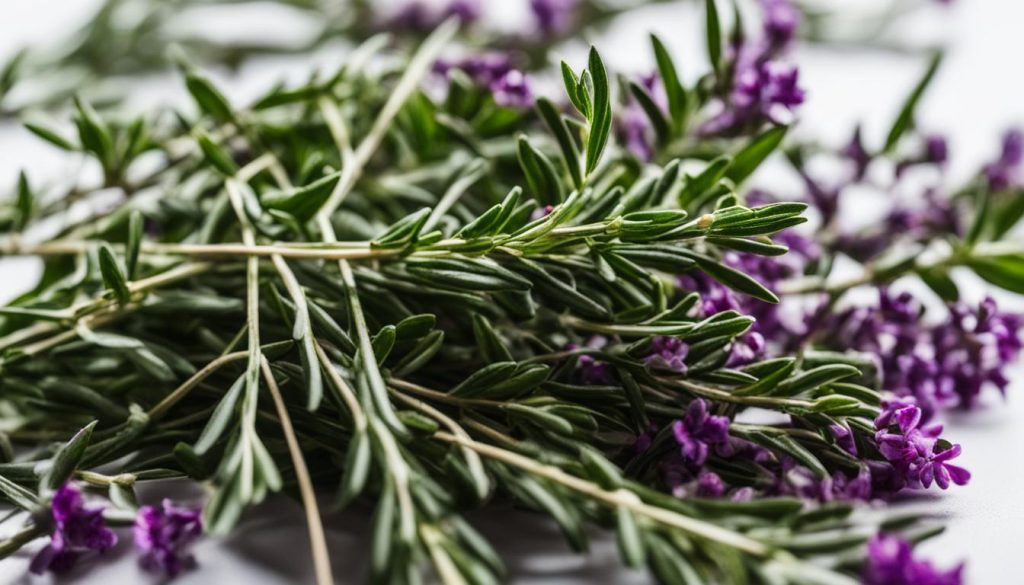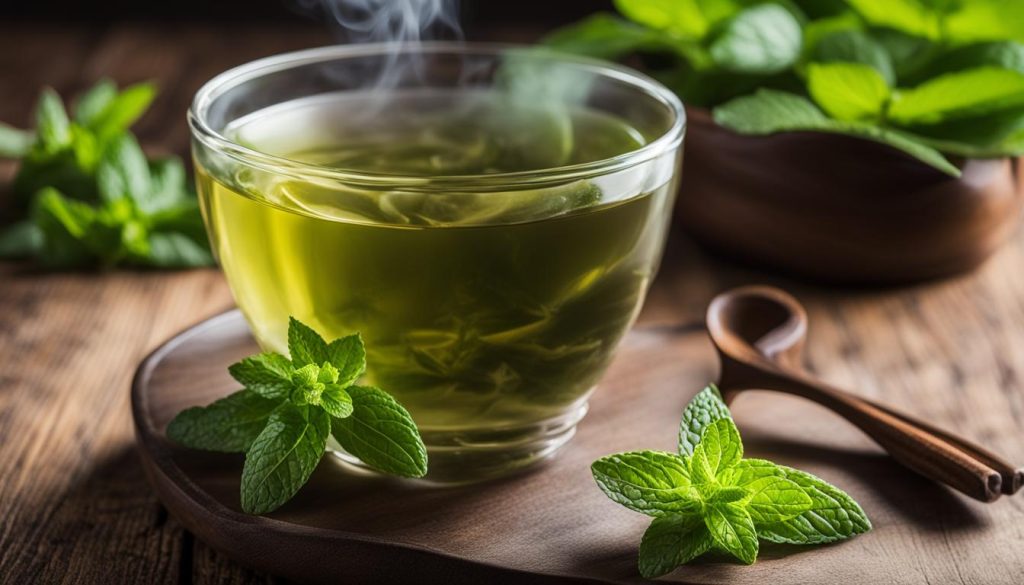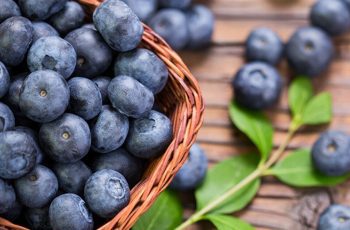Are you tired of dealing with joint pain and searching for natural remedies to find relief? Look no further! In this article, I will share with you the top herbs that have been proven to provide relief from joint pain and inflammation.
Joint pain can be debilitating and affect your daily life. Many people turn to herbal supplements and remedies as a natural alternative to conventional medications. These herbs for joint pain have been used for centuries in traditional medicine and have shown promising results in alleviating joint pain and improving joint health.
Key Takeaways
- Ginger, thyme, turmeric, green tea, cinnamon, garlic, black pepper, and cayenne are natural herbs known for their anti-inflammatory properties.
- These herbs can be consumed in various forms, such as teas, supplements, or by incorporating them into your meals.
- Consult with your doctor before starting any herbal treatment, especially if you are taking other medications.
- Incorporating these natural herbs into your daily routine can be a holistic approach to joint health and may help alleviate pain and improve overall well-being.
- Remember to listen to your body and find the herb(s) that work best for you.
Now, let’s dive deeper into each of these incredible herbs for joint pain and discover how they can provide you with much-needed joint pain relief.
Ginger: Anti-Inflammatory Herbs for Joint Pain Relief
Ginger, a herb with a long history in Asian medicine, offers natural relief for joint pain and inflammation. With its potent anti-inflammatory properties, ginger has been found to suppress inflammatory molecules and synthesize prostaglandins, which are responsible for pain and inflammation in the body. In fact, research suggests that ginger may even improve symptoms of rheumatoid arthritis by influencing the expression of certain genes.
To incorporate ginger into your daily routine, there are various options available. You can stir-fry dishes with ginger, enjoy the tangy flavor of pickled ginger, or add grated ginger to soups and smoothies. By including ginger in your diet, you can harness its beneficial properties and promote joint health.
Thyme: A Fragrant Herb for Joint Pain Relief
Another herbs for joint pain relief is thyme. Thyme is a fragrant herb with high antioxidant capabilities and anti-inflammatory properties. It is commonly used in cuisine and has been found to be effective for arthritis, inflammation, and joint pain relief. Thyme can be added as a flavorful addition to various dishes like meat, poultry, beans, tomatoes, eggs, soups, and stews.
Thyme is not only a delicious herb but also a natural remedy for joint pain. Its anti-inflammatory properties can help reduce swelling and discomfort associated with joint inflammation. Additionally, thyme contains antioxidants that can neutralize harmful free radicals and protect the joints from further damage.
To incorporate thyme into your diet, consider adding it to your favorite recipes. Sprinkle fresh or dried thyme leaves over grilled meats or roasted vegetables for an extra burst of flavor. You can also infuse thyme into oils or use it to make a fragrant herbal tea.
Remember to use thyme in moderation as its strong flavor can overpower other ingredients. Start with a small amount and adjust to your taste preferences. Enjoy the benefits of thyme while delighting your taste buds!

Turmeric: A Golden Spice for Joint Pain Relief
Turmeric has gained popularity in traditional medicine, particularly ayurvedic and Chinese medicine, for its remarkable anti-inflammatory properties that can alleviate symptoms of arthritis and musculoskeletal disorders. Thus, it is one of the best herbs for joint pain. The active compound in turmeric, curcumin, has been extensively studied and has been found to possess potent anti-inflammatory effects, especially in rheumatoid arthritis.
To incorporate turmeric into your diet, you can simply add it to various dishes such as soups, stews, and curry dishes. Its warm and earthy flavor pairs well with a wide range of ingredients. For optimal absorption and enhanced benefits, combine turmeric with black pepper, as it has been shown to improve curcumin’s bioavailability.
If you prefer a more concentrated form of turmeric, you can also find it as a dietary supplement. However, it is crucial to consult with a healthcare professional, especially if you are taking blood-thinning medication, as turmeric may interact with certain medications.
Benefits of Turmeric Herbs for Joint Pain Relief:
- Reduces inflammation in joint tissues
- Alleviates pain and swelling
- Improves joint mobility and flexibility
- Supports overall joint health
- May help manage symptoms of arthritis
Incorporating turmeric into your daily routine can be an excellent natural approach to managing joint pain and promoting joint health. However, it is important to remember that turmeric should not replace medical treatment. Consult with your healthcare professional to develop the most suitable treatment plan for your condition.
Green Tea: An Antioxidant-Rich Herb for Joint Pain Relief
When it comes to finding natural remedies or herbs for joint pain, green tea is a top contender. Not only does it offer a refreshing and soothing beverage option, but it also contains powerful antioxidants that can provide relief from joint inflammation and pain.
One of the key components of green tea that makes it beneficial for joint health is its high content of polyphenols. These polyphenols have been found to reduce inflammation in the body and protect the joints from further damage. Additionally, green tea has been shown to trigger immune responses that can ease the severity of arthritis symptoms.
Research conducted on arthritis-induced rats has shown that green tea extract has superior anti-inflammatory effects when compared to black tea. This suggests that green tea may be more effective at reducing joint pain and inflammation than other types of teas.
There are various ways to incorporate green tea into your daily routine. You can enjoy it as a hot or iced tea, or try matcha powder made from ground green tea leaves for a concentrated dose of antioxidants. Regardless of how you choose to consume it, green tea can be a delicious and effective addition to your joint pain relief regimen.

Remember, if you have any underlying health conditions or are currently taking medications, it’s always a good idea to consult with your healthcare provider before adding green tea or any other herbal remedy to your routine. They can provide personalized advice and ensure it’s safe for you to use.
Next up, let’s explore the benefits of another delightful herb for joint pain relief – cinnamon!
Cinnamon: A Delicious Spice for Joint Pain Relief
Cinnamon is not only a tasty spice but also a powerful ally in relieving joint pain. One of the herbs for joint pain relief, it possesses antioxidant properties that can effectively inhibit cell damage and reduce blood sugar and cholesterol levels. What’s more, research has shown that cinnamon has anti-inflammatory effects, making it particularly beneficial for arthritis and joint inflammation.
You can easily incorporate cinnamon into your daily routine to reap its joint pain-relieving benefits. Sprinkle cinnamon on your oatmeal to add flavor and enhance the nutritional value. Blend it into smoothies for a delightful twist and a dash of healthiness. You can also introduce cinnamon to your soups, stews, and even teas or ciders for a warm and comforting experience.
However, it’s important to consume cinnamon in moderation, especially if you are pregnant. Additionally, if you’re taking blood-thinning medication, it’s advisable to consult with your doctor, as cinnamon may interfere with its effectiveness.
Make the most out of this delicious spice and say goodbye to joint pain with the help of cinnamon. But remember, moderation is key!
Conclusion
Natural herbs can provide effective relief from joint pain and inflammation. Ginger, thyme, turmeric, green tea, cinnamon, garlic, black pepper, and cayenne are all herbal options that have been proven to have potent anti-inflammatory properties.
These herbs can be easily incorporated into your daily routine to support joint health and alleviate discomfort. You can enjoy them in various forms, such as teas, supplements, or by adding them to your meals.
However, it is essential to consult with a medical professional before starting any herbal treatment, especially if you are already taking other medications. They can guide you on the appropriate dosage and any potential interactions.
By incorporating these natural herbs into a holistic approach to joint health, you can experience relief from pain, reduce inflammation, and improve your overall well-being. Explore the benefits of these incredible natural remedies and take proactive steps towards better joint health today!
FAQ
Can herbs provide relief from joint pain?
Yes, certain herbs have been found to have anti-inflammatory properties and can help alleviate joint pain and inflammation.
What are some natural herbs that can help with joint pain?
Ginger, thyme, turmeric, green tea, cinnamon, garlic, black pepper, and cayenne are herbs that have been found to provide relief from joint pain.
How can ginger help with joint pain relief?
Ginger has anti-inflammatory properties and can improve rheumatoid arthritis symptoms. It can be consumed by stir-frying dishes, eating pickled ginger, or adding grated ginger to soups or smoothies.
What is the role of thyme in joint pain relief?
Thyme is a fragrant herb with high antioxidant capabilities and anti-inflammatory properties. It can be added to various dishes like meat, poultry, beans, tomatoes, eggs, soups, and stews to provide therapeutic benefits for rheumatoid arthritis.
How does turmeric help in relieving joint pain?
Turmeric has anti-inflammatory effects on rheumatoid arthritis. The active ingredient in turmeric, curcumin, has been found to have anti-inflammatory effects. It can be added to soups, stews, curry dishes, and is absorbed better when combined with black pepper.
Can green tea assist with joint pain relief?
Yes, green tea contains polyphenols that reduce inflammation, protect joints, and trigger immune responses that ease arthritis severity. It can be consumed as hot or iced tea or as matcha powder made from ground green tea leaves.
How can cinnamon help with joint pain relief?
Cinnamon has powerful antioxidant properties that reduce inflammation and reduce disease activity in rheumatoid arthritis. It can be added to oatmeal, smoothies, soups, stews, oranges, teas, or ciders for both flavor and health benefits.
Are there any precautions to take when using herbs for joint pain relief?
It is important to consult with a doctor before starting any herbal treatment, especially if taking other medications. Some herbs may interact with certain medications, and individual sensitivities and allergies should be considered as well.




